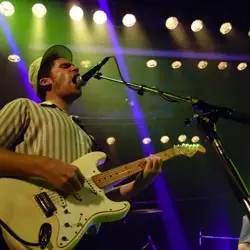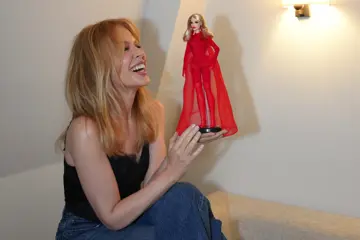 Parquet Courts
Parquet CourtsIt's difficult to pinpoint just why New York-based outfit Parquet Courts have taken the indie world by storm in recent times, but they've sure carved a defiantly uncompromising swathe through everything that they've touched in the last year or so.
The oft-cited notion of 'authenticity' clearly has some role to play in the equation. A cherished attribute in all realms independent, Parquet Courts laid claims to being 'authentic' the second they released their first collection of songs, American Specialties, on a run of limited edition cassettes back in 2011 (it's since been re-released on vinyl), and then self-issued their debut long-player proper, Light Up Gold, on frontman Andrew Savage's indie imprint Dull Tools the following year (this too was quickly snapped up by a larger US label and eventually licensed all over the globe).
This DIY bent was exacerbated by the fact that Parquet Courts never seemed interested in pandering to trends or the media in an attempt to push their own agenda. Equally refreshing has been their uncompromising stance on album artwork and other peripheral aspects of their craft, and the fact that they seem to give cultural ambitions far more weight than any commercial considerations.
But cred alone does not a buzz band make, so there's got to be more to their dizzyingly rapid ascent. Obviously their distinctive music is a massive factor in making Parquet Courts so suddenly revered, but it's equally tough pinpointing just why these idiosyncratic songs have resonated so profoundly with so many. While they're often compared to such cherished acts as Pavement, Television, The Fall or The Modern Lovers, they don't really sound like any of them all that much. On the surface it's a mess of contradictions – the music is simple but nuanced, economical but uplifting, frantic but relaxing, skeletal but possessing great depth. And their quick-fire lyrics are also imperative to their magnetic appeal, their words sometimes flippant, occasionally profound, always obtuse but never less than intriguing.
Don't miss a beat with our FREE daily newsletter
At the end of the day they just sound like Parquet Courts. They're four young guys doing their own thing their own way at their own pace, and it's this devil-may-care attitude that seems to be winning them hearts wherever they go.
“Being famous is definitely not a goal for Parquet Courts,” Savage smiles. He also finds the notion of chasing notoriety faintly ridiculous. “There's certain opportunities that we've had that we've declined because it just didn't feel right for us, but I know what you mean – it's been the first band that I've been in which sells out shows, or that has people coming up to me after shows and telling me how much they like the record. That's happened before but it happens much more frequently with Parquet Courts. I'd definitely say that fame is by no means a goal for anyone in the band, but it's nice to play to more people than we have before though.
“I don't tend to think of things in terms of career arcs, but my goals for Parquet Courts are the same that they probably were from day one – just to write good songs that I'm happy with, and to make cool albums and keep playing shows. And just to keep doing it for as long as we can.”
Savage is joined in Parquet Courts by his brother Max (drums), Austin Brown (guitar/vocals) and Sean Yeaton (bass) – did the foursome actually articulate a vision for the band when they first set out?
“Sure we had a vision early on, and for the most part it hasn't changed – I guess things have been added to it because things happen that you don't predict,” Savage ponders. “We wrote the first Parquet Courts songs nearing three years ago now – I think the first practice was December 2010, so it's coming right up on three years – so obviously songwriting and the way that you write songs changes after three years. So we have the same sort of vision – it's changed slightly, but not really wavered off-path.”
Savage believes that this evolution in his writing will continue – he's the band's main songsmith, although Brown also pulls his weight in this regard – just as his own musical predilections are always changing and adapting.
“Oh yeah, I love keeping up with what's coming out – it'd be ridiculous if my music taste just froze in my late 20s,” he offers. “I'm a record nerd through and through – I buy new stuff all the time – so my taste is always changing. Not just in music, but basically everything in life.
“I like to read, for instance, and I suppose that might [seep into the music]. I guess it's fair to say of anybody who reads a fair amount – the same as when you're consuming any form of art, be it visual art or music or literature – you pick up things that you like, and things that you think would be exciting if you emulated them in your own work.”
And while he enjoys the responsibility of guiding the band's aesthetic, Savage loves getting onstage and sharing his art with punters just as much.
“There's no other feeling like when you've written a really good song that you feel fully represents you and fully represents the emotion that you were trying to communicate. But there's also nothing like the thrill of doing that in front of people,” he laughs. “I don't know, they all kind of feel one and the same – it's all part of being in a band to me.
“I write for myself. My motive for writing is to kind of capture an emotion and to express myself in the freshest way possible – to be representative of my emotions, but also to do it tastefully. That's the reason I do it. The performance part of it is great and it's a thrill, but I wouldn't say that I write songs to perform them.”
Parquet Courts have indeed spent much of 2013 sharing their visceral music with fans both at home and abroad, and now it's Australia's turn as they set their sights on Laneway Festival and some corresponding headline shows.
“We like to have the live show be somewhat similar to the record,” Savage tells of the Parquet Courts gig experience. “We don't really take the time to do a whole lot of banter between songs, we just kind of start the next song as soon as one song stops, bearing in mind changing guitars for different tunings and stuff. We pretty much just like to pack in as many songs as we can, and that's kind of the way the record feels to me. We'll play a lot of new stuff – we have a lot of new material that we've been playing throughout the year – but more or less at this point I'd say we're playing most of Light Up Gold in the set and maybe a few songs off American Specialties and like six new songs that we've got in the set.”
When Savage references “new songs”, he means even more recent than the tracks from recently dropped EP Tally All The Things That You Broke – it seems remarkable that they've been so productive given their recent workload.
“I can write on the road – there's not really a circumstance that keeps me from writing, fortunately,” he smiles. “I can do better stuff and go more in-depth when I'm at home in my comfort zone, but actually to tell you the truth my comfort zone actually expanded to me being nomadic this year – I've started to feel like it hasn't been a hindrance for writing.”
And he's even found the time to keep Dull Tools going.
“Yeah, we're working on a few records right now,” he enthuses. “We just put out a record a few months ago by a band called Yuppies from Omaha – it's an amazing record. I think it's important to be an advocate for people that you believe in, as people have done for me in my history of being in bands – and I'm grateful to them for doing so. I guess I see kind of a trend or a thread that weaves current bands together, and there's my idea of a scene and I just want to have a better hand in defining it.
“There's definitely an international thing that I see going on – so far I've only put out American bands, but that's not to say that I wouldn't put out an Australian band because a lot of my current favourite bands are from Australia right now – there's a great scene down there. It's definitely not geographical, but more about the music and mindset.”















